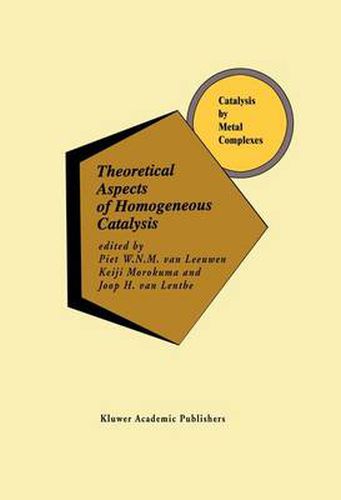Readings Newsletter
Become a Readings Member to make your shopping experience even easier.
Sign in or sign up for free!
You’re not far away from qualifying for FREE standard shipping within Australia
You’ve qualified for FREE standard shipping within Australia
The cart is loading…






This title is printed to order. This book may have been self-published. If so, we cannot guarantee the quality of the content. In the main most books will have gone through the editing process however some may not. We therefore suggest that you be aware of this before ordering this book. If in doubt check either the author or publisher’s details as we are unable to accept any returns unless they are faulty. Please contact us if you have any questions.
Homogeneous catalysis plays an important role both in the laboratory and in the industry. Successful applications in industry involve new polymerisation processes with complexes of zirconium and related metals, new carbonylation processes employing palladium and rhodium, ring opening polymerisations, and new enantioselective isomerisation catalysts as in the preparation of menthol. Also in the synthesis of organic compounds in the laboratory highly selective homogeneous catalysts represent an irreplaceable part of the toolbox of the synthetic chemist. Examples of such reactions are cross-coupling (Ni, Pd), nucleophilic substitution of allylpalladium complexes, Heck reactions (Pd), asymmetric epoxidation, Wacker type reactions (Pd), asymmetric hydrogenations (Rh, Ru), reactions of chromium complexes, enantioselective reactions with Lewis acids, reactions with the McMurry reagent, etc. There is hardly any multistep organic synthesis that does not involve one of these metal catalysed reactions. Most of these catalysts have been developed by empiricism. The metal catalysed processes consist of a series of elementary steps which often have been studied in isolation in organometallic chemistry. The knowl- edge of such elementary steps - effect ofligands, anions, coordination number, valence states - has greatly contributed to the development of improved cata- lysts for the reactions mentioned above. In addition to the empirical approach theoretical methods have given support and guidance to the development of improved processes. Often the key steps of a cycle escape from a direct ob- servation and then theoretical contributions are even more wanted.
$9.00 standard shipping within Australia
FREE standard shipping within Australia for orders over $100.00
Express & International shipping calculated at checkout
Stock availability can be subject to change without notice. We recommend calling the shop or contacting our online team to check availability of low stock items. Please see our Shopping Online page for more details.
This title is printed to order. This book may have been self-published. If so, we cannot guarantee the quality of the content. In the main most books will have gone through the editing process however some may not. We therefore suggest that you be aware of this before ordering this book. If in doubt check either the author or publisher’s details as we are unable to accept any returns unless they are faulty. Please contact us if you have any questions.
Homogeneous catalysis plays an important role both in the laboratory and in the industry. Successful applications in industry involve new polymerisation processes with complexes of zirconium and related metals, new carbonylation processes employing palladium and rhodium, ring opening polymerisations, and new enantioselective isomerisation catalysts as in the preparation of menthol. Also in the synthesis of organic compounds in the laboratory highly selective homogeneous catalysts represent an irreplaceable part of the toolbox of the synthetic chemist. Examples of such reactions are cross-coupling (Ni, Pd), nucleophilic substitution of allylpalladium complexes, Heck reactions (Pd), asymmetric epoxidation, Wacker type reactions (Pd), asymmetric hydrogenations (Rh, Ru), reactions of chromium complexes, enantioselective reactions with Lewis acids, reactions with the McMurry reagent, etc. There is hardly any multistep organic synthesis that does not involve one of these metal catalysed reactions. Most of these catalysts have been developed by empiricism. The metal catalysed processes consist of a series of elementary steps which often have been studied in isolation in organometallic chemistry. The knowl- edge of such elementary steps - effect ofligands, anions, coordination number, valence states - has greatly contributed to the development of improved cata- lysts for the reactions mentioned above. In addition to the empirical approach theoretical methods have given support and guidance to the development of improved processes. Often the key steps of a cycle escape from a direct ob- servation and then theoretical contributions are even more wanted.